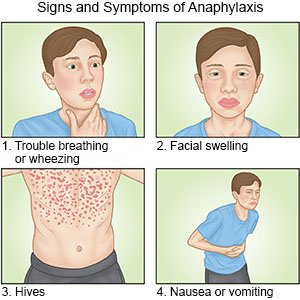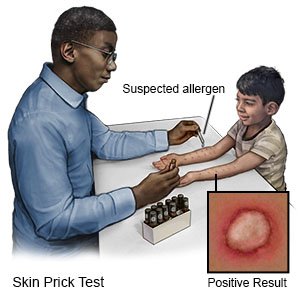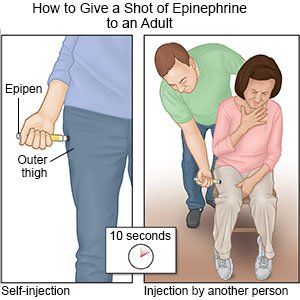Food Allergy
Medically reviewed by Drugs.com. Last updated on Sep 1, 2024.
What is a food allergy?
A food allergy is an immune system reaction to a food. A food allergen is an ingredient or chemical in a food that causes your immune system to react. Allergic reactions happen when your immune system fights too strongly against an allergen and causes you to get sick. Allergic reactions can happen within minutes to several hours after you eat, touch, or smell the food. You can also have a second reaction up to 8 hours later.
What increases my risk for a food allergy?
A food allergy can develop at any time. Many children outgrow allergies to peanut, milk, wheat, and egg by late childhood. Food allergies that develop in adults often do not go away. Food allergies often begin in children aged 2 years or younger. A family history of a food allergy increases the risk. You are more likely to have food allergies if you also have eczema, hay fever, or asthma.
What are the most common food allergies?
- Peanuts
- Tree nuts such as walnuts
- Eggs
- Fish and shellfish
- Milk
- Soy
- Wheat
What are the signs and symptoms of a food allergy?
- Mild symptoms include itching, a rash, or swelling.
- Anaphylaxis symptoms include throat tightness, trouble breathing, tingling, dizziness, and wheezing. Anaphylaxis is a sudden, life-threatening reaction that needs immediate treatment.

How are food allergies diagnosed?
Your healthcare provider will ask about your symptoms after you eat, touch, or smell certain foods. Your provider will ask how long it takes for symptoms to appear and how long they last. Your provider will also ask about the amount of food that triggers symptoms. You may need to keep a food diary to write down everything you eat and any symptoms that develop. You may need additional testing if you developed anaphylaxis after you were exposed to a trigger and then exercised. This is called exercise-induced anaphylaxis. A trigger can be any food or a specific food you are allergic to. You may also need the following:
- A skin prick test is used to check for an allergy to certain foods. Your provider will scratch tiny bits of different foods under your skin. If a bump appears within a few minutes, you likely have an allergy to that food.

- Blood tests may be used to find antibodies that lead to food allergies. An antibody is part of your immune system.
- An elimination diet is used to help you avoid a food for several weeks to see if your symptoms get better.
- Food challenge means you eat small amounts of foods that you may be allergic to. A provider stays with you to watch for and treat any allergic reactions.
How is an allergic reaction to food treated?
You may need to see specialists, such as an allergist or dietitian, for ongoing care. Your provider may want to test you regularly to see if the food allergy changes. Write down your questions so you remember to ask them during follow-up visits. The following may be needed:
- Antihistamines decrease mild symptoms such as itching or a rash.
- Epinephrine is used to treat severe allergic reactions such as anaphylaxis.
Treatment options
The following list of medications are related to or used in the treatment of this condition.
What steps do I need to take for signs or symptoms of anaphylaxis?
- Immediately give 1 shot of epinephrine only into the outer thigh muscle.

- Leave the shot in place as directed. Your provider may recommend you leave it in place for up to 10 seconds before you remove it. This helps make sure all of the epinephrine is delivered.
- Call 911 and go to the emergency department, even if the shot improved symptoms. Do not drive yourself. Bring the used epinephrine shot with you.
What safety precautions do I need to take if I am at risk for anaphylaxis?
- Keep 2 shots of epinephrine with you at all times. You may need a second shot, because epinephrine only works for about 20 minutes and symptoms may return. Your provider can show you and family members how to give the shot. Check the expiration date every month and replace it before it expires.
- Create an action plan. Your provider can help you create a written plan that explains the allergy and an emergency plan to treat a reaction. The plan explains when to give a second epinephrine shot if symptoms return or do not improve after the first. Give copies of the action plan and emergency instructions to family members, work and school staff, and daycare providers. Show them how to give a shot of epinephrine. Update the plan as the allergy changes.
- Do not eat the food that causes your allergy. Even a small taste can cause an allergic reaction. Your provider or a dietitian can help you plan a balanced diet. Babies may need to drink a formula that does not contain milk or soy. A dietitian can teach you how to read labels for ingredients that cause your allergies.
- Carry medical alert identification. Wear jewelry or carry a card that says you have a food allergy. Ask your provider where to get these items.
- Ask about ingredients in foods prepared outside your home. When you eat out, ask what is in the food you want to order. Ask how food is prepared. Fried foods may contain small amounts of food allergens, such as nuts and shellfish.
- Be careful when you exercise. If you have had exercise-induced anaphylaxis, do not exercise right after you eat. Stop exercising right away if you start to develop any signs or symptoms of anaphylaxis. You may first feel tired, warm, or have itchy skin. Hives, swelling, and severe breathing problems may develop if you continue to exercise.
- Wash your hands before and after meals. Do not share utensils or food.

What do I need to know about vaccines and egg allergy?
Tell healthcare providers if you have an egg allergy before you receive any vaccine. Some vaccines contain egg protein that can cause an anaphylactic reaction. The flu vaccine is considered safe for a person with an egg allergy. An egg-free vaccine may be available. Your provider will tell you if you should get the egg-free vaccine instead. You may need tests before you can receive certain other vaccines. Your provider can give you more information.
Call your local emergency number (911 in the US) for signs or symptoms of anaphylaxis,
such as trouble breathing, swelling in your mouth or throat, or wheezing. You may also have itching, a rash, hives, or feel like you are going to faint.
When should I seek immediate care?
- You have itching or hives that spread all over your body.
When should I call my doctor?
- You have new or worsening rashes, hives, or itching.
- You have an upset stomach or are vomiting.
- You have stomach cramps or diarrhea.
- You have questions or concerns about your condition or care.
Care Agreement
You have the right to help plan your care. Learn about your health condition and how it may be treated. Discuss treatment options with your healthcare providers to decide what care you want to receive. You always have the right to refuse treatment. The above information is an educational aid only. It is not intended as medical advice for individual conditions or treatments. Talk to your doctor, nurse or pharmacist before following any medical regimen to see if it is safe and effective for you.© Copyright Merative 2024 Information is for End User's use only and may not be sold, redistributed or otherwise used for commercial purposes.
Learn more about Food Allergy
- Allergies, Cough/Cold Medications and Alcohol Interactions
- Back to School Basics: 5 Common Health Questions
- Benadryl Dosage Charts for Infants and Children
- Claritin Dosage Charts for Infants and Children
- EpiPen Costs and Alternatives: What Are Your Best Options?
- Low Salicylate Diet
- Zyrtec Dosage Charts for Infants and Children
Treatment options
Care guides
Symptoms and treatments
Medicine.com guides (external)
Further information
Always consult your healthcare provider to ensure the information displayed on this page applies to your personal circumstances.
